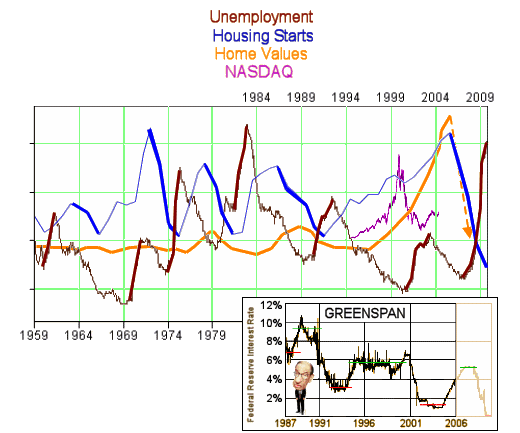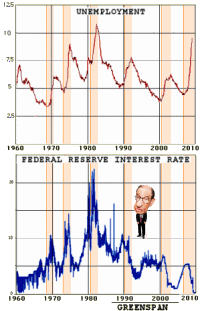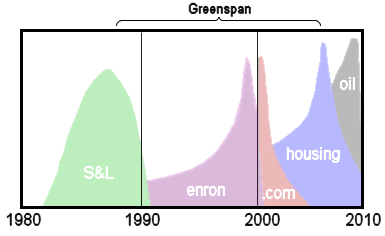
But back to the future and the question I set out to explore in the first place in the new norm?… before I got sidetracked onto the "housing bubble" and Alan Greenspan.  My question is simply whether the current mess is what it seems to be, the rubble of economy hijacked by a thoughtless business elite, or it means that we are fundamentally in trouble. My intuition had been the latter – that we’ve moved too far away from our laborers, and that there just aren’t enough jobs to go around. But I’m beginning to change my mind about that. Ever since the days of Ronald Reagan, our government policy has been heavily weighted towards profitability for the rich, even in the Clinton interlude. The antics at the top have just been too chronically outrageous not to have had a tremendous impact on our economic fate.
My question is simply whether the current mess is what it seems to be, the rubble of economy hijacked by a thoughtless business elite, or it means that we are fundamentally in trouble. My intuition had been the latter – that we’ve moved too far away from our laborers, and that there just aren’t enough jobs to go around. But I’m beginning to change my mind about that. Ever since the days of Ronald Reagan, our government policy has been heavily weighted towards profitability for the rich, even in the Clinton interlude. The antics at the top have just been too chronically outrageous not to have had a tremendous impact on our economic fate.
WASHINGTON — For years, a Congressional hearing with Alan Greenspan was a marquee event. Lawmakers doted on him as an economic sage. Markets jumped up or down depending on what he said. Politicians in both parties wanted the maestro on their side. But on Thursday, almost three years after stepping down as chairman of the Federal Reserve, a humbled Mr. Greenspan admitted that he had put too much faith in the self-correcting power of free markets and had failed to anticipate the self-destructive power of wanton mortgage lending.
“Those of us who have looked to the self-interest of lending institutions to protect shareholders’ equity, myself included, are in a state of shocked disbelief,” he told the House Committee on Oversight and Government Reform. Now 82, Mr. Greenspan came in for one of the harshest grillings of his life, as Democratic lawmakers asked him time and again whether he had been wrong, why he had been wrong and whether he was sorry.
Critics, including many economists, now blame the former Fed chairman for the financial crisis that is tipping the economy into a potentially deep recession. Mr. Greenspan’s critics say that he encouraged the bubble in housing prices by keeping interest rates too low for too long and that he failed to rein in the explosive growth of risky and often fraudulent mortgage lending. “You had the authority to prevent irresponsible lending practices that led to the subprime mortgage crisis. You were advised to do so by many others,” said Representative Henry Waxman of California, chairman of the committee. “Do you feel that your ideology pushed you to make decisions that you wish you had not made?” Mr. Greenspan conceded: “Yes, I’ve found a flaw. I don’t know how significant or permanent it is. But I’ve been very distressed by that fact”…
But as the Fed slashed interest rates to nearly record lows from 2001 until mid-2004, housing prices climbed far faster than inflation or household income year after year. By 2004, a growing number of economists were warning that a speculative bubble in home prices and home construction was under way, which posed the risk of a housing bust. Mr. Greenspan brushed aside worries about a potential bubble, arguing that housing prices had never endured a nationwide decline and that a bust was highly unlikely.
Mr. Greenspan, along with most other banking regulators in Washington, also resisted calls for tighter regulation of subprime mortgages and other high-risk exotic mortgages that allowed people to borrow far more than they could afford. The Federal Reserve had broad authority to prohibit deceptive lending practices under a 1994 law called the Home Owner Equity Protection Act. But it took little action during the long housing boom, and fewer than 1 percent of all mortgages were subjected to restrictions under that law…
"Those of us who have looked to the self-interest of lending institutions to protect shareholders’ equity, myself included, are in a state of shocked disbelief."
Clearly, sustained low inflation implies less uncertainty about the future, and lower risk premiums imply higher prices of stocks and other earning assets. We can see that in the inverse relationship exhibited by price/earnings ratios and the rate of inflation in the past. But how do we know when irrational exuberance has unduly escalated asset values, which then become subject to unexpected and prolonged contractions as they have in Japan over the past decade? And how do we factor that assessment into monetary policy? We as central bankers need not be concerned if a collapsing financial asset bubble does not threaten to impair the real economy, its production, jobs, and price stability. Indeed, the sharp stock market break of 1987 had few negative consequences for the economy. But we should not underestimate or become complacent about the complexity of the interactions of asset markets and the economy. Thus, evaluating shifts in balance sheets generally, and in asset prices particularly, must be an integral part of the development of monetary policy.
Alan Greenspan clearly made a gigantic mistake. He was just plain wrong and it showed to all the world. Even if he didn’t see it coming, it was a massive failing on his part because that was his job.  Does that mean he was motivated by evil or greed – some unsavory motive? Was he in cahoots with the bad guys? That seems unlikely to me.Yet during his tenure, the economy was barraged with a series of major financial disasters that seemed to come in waves. He shepherded the economy in the aftermath of "deregulation" – started around 1980 with Reagan’s election. Actually, it started a little before Reagan at the time when the nation’s Savings and Loans were already in deep trouble.
Does that mean he was motivated by evil or greed – some unsavory motive? Was he in cahoots with the bad guys? That seems unlikely to me.Yet during his tenure, the economy was barraged with a series of major financial disasters that seemed to come in waves. He shepherded the economy in the aftermath of "deregulation" – started around 1980 with Reagan’s election. Actually, it started a little before Reagan at the time when the nation’s Savings and Loans were already in deep trouble.
It continues to amaze me how Greenspan is “shocked” at what happened. Of course, I was not even thinking about such things back then, but in retrospect it seems to me that the simple application of kitchen table financial understanding would have told you this couldn’t last.
Seems to me we needed a little more common sense and less economic theory.
[…] back to the future… […]
[…] back to the future… […]